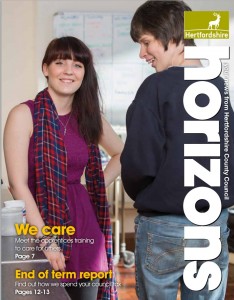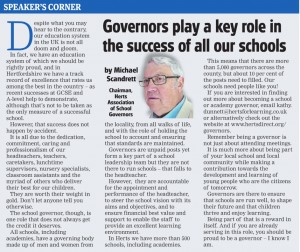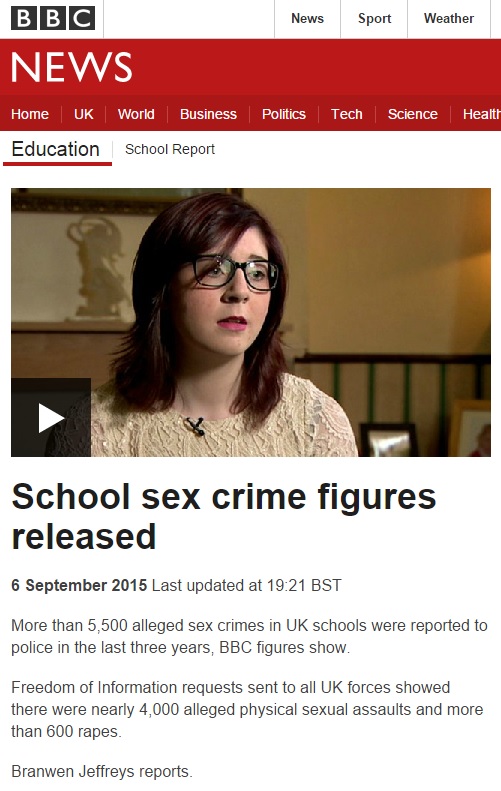Outstanding Governors 2015

The outstanding work of school governors in Hertfordshire has been recognised again in 2015 Outstanding School Governors Awards. The awards are run by Hertfordshire Association of School Governors (HASG) and the UK’s largest, not-for-profit School Company, Herts for Learning, The awards ceremony took place on Saturday 14th November at Hertfordshire Development Centre in Stevenage and formed part of the Hertfordshire Governors Annual Conference. The Awards were presented by Councillor David Williams, cabinet member for education at Herts County Council.
The awards were established last year to publicly recognise, not only the contribution of individual school governors, but to celebrate the dedication and commitment of all governors in Hertfordshire’s 500+ schools. Schools across the county were asked to nominate governors who they believe have really made a difference and helped to improve the educational outcomes of children in their school. Many nominations were received and reviewed by an independent panel of judges and from these; a short-list of 10 governors was drawn up. The judges visited all the nominees’ schools to gather more information. After further review 4 winners and 2 runners up were selected. Each winner attracted a prize for their school(s) of £500 and a £50 individual prize.
The four Outstanding Governor of the Year Awards went to:

St Albans Girls’ School

St.Mary’s Church of England
High School, Cheshunt

The Barclay School / Almond Hill Junior School, Stevenage

William Ransom Primary School, Hitchin
The two runners up were:

Ludwick Nursery School, Welwyn Garden City

Roger De Clare First School & Nursery, Puckeridge
The other finalists were:
- Sarah Murdoch Hillshott Infant School and Nursery, Letchworth Garden City
- Robin Osterley Hunsdon JMI, Hunsdon
- Chris Partridge Parmiter’s School, Garston,
- Sarah Starr Wheatfields Infants and Nursery School, St Albans
What made the difference?
The finalist merited their selection through glowing nominations, some key elements of which are given below:
- Claire Barnard truly epitomises the critical friend. She a consummate professional and attends every governing body meeting with knowledge, challenge and enthusiasm.
- Maureen Bruce leads our Governing body with dedication, commitment, tenacity and vision. She is devoted to the school and the progress of its young people.
- Nicky Clarke launched the Stevenage Inspire Federation. She was relentless in promoting the positive benefits of federation to both schools. She took the brunt of the workload upon herself. The enormous success of the federation, is very much down to her lead.
- Ian Hankin has grit and determination, meticulous attention to detail, hard work, dedication and care for the staff and pupils. He deserves to be recognised as he really does go above and beyond the call of duty.
- Margaret Birleson has driven the transformation of Ludwick from a standalone nursery school to a multifaceted early years centre. Whilst chair, the school has received 3 consecutive outstanding Ofsted reports.
- Wendy Smith during her time as a governor has overseen the change of three Headteachers and been on hand to support when necessary. Wendy holds the school to account for the decisions that are made.
- Sarah Murdoch has pushed the governing body to become more professional and strategic in its direction. She has organised a regular programme of governor events which has raised the profile of governors.
- Robin Osterley leads by example. Meetings are run efficiently, with an emphasis on improving outcomes and opportunities for pupils. He is very supportive but is never afraid to act as “critical friend”. He deals with difficult situations.
- Chris Partridge has contributed far and beyond what would normally be expected of a school governor, he led a full review of the composition and direction of the Governing Body. His knowledge of the ever-changing Governors’ Handbook has become legendary.
- Sarah Starr chaired the “Impact on Learning” sub-committee addressing the substantial number of issues raised by Ofsted. She transformed the meeting template and working practice and was also the Governor link to several important JARV meetings.
The Hertfordshire Association of School Governors is an independent organisation that supports and informs school governors, to ensure their views are heard and to promote high standards in school governance.
Herts for Learning Ltd, is the UK’s largest School company. Developed from Hertfordshire Local Authority’s education services, the company is 80% owned by schools (20% by Hertfordshire County Council), with 98% of Hertfordshire schools now owning a share of the company. A not-for-profit organisation dedicated to raising standards and improving teaching and learning, Herts for Learning Ltd provides high quality teaching, learning, leadership and business support to schools and education settings in Hertfordshire and beyond.




 The County Council believes that there is benefit in a degree of commonality or co-ordination of school term and holiday dates across all Academy and Maintained schools. We are therefore seeking the view of all schools on these proposals, and not only community/ voluntary controlled schools.
The County Council believes that there is benefit in a degree of commonality or co-ordination of school term and holiday dates across all Academy and Maintained schools. We are therefore seeking the view of all schools on these proposals, and not only community/ voluntary controlled schools.




